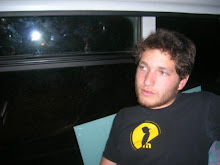My last class on Thursdays before I'm officially on weekend is called "Water Resources of the Middle East--Negotiation, Policy and Management," with Dr. Clive Lipchin. Clive is a pretty awesome professor who DEFINITELY knows his stuff. Anyways, we were talking about (the lack of) natural, available water resources for Palestinians in the West Bank. Essentially, Israel has the money, resources, and technology to use and develop her territory's water resources, while the Palestinians do not. The whole situation is pretty complicated (surprised?) as almost every water resource in Israel is transboundary, meaning is shared by at least two territories. How does one share water when one country is at war with another? A little background: At Oslo, for the first time Israel recognized in writing the Palestinian people's rights to water (but conveniently didn't specify how much water, or what kinds of water rights). So post Oslo, the Palestinian Water Authority (PWA) was founded so that Palestinians could begin to build their own water management infrastructure and policies instead of depending on Israel. The PWA in theory is very nice, and works in conjunction very well with its Israeli counterparts in the Israel Water Authority in research projects, but when it comes to putting real projects into action, things are still basically impossible.
Clive gave our class a recent personal example. He was at a meeting with Palestinian and Israeli water experts and authorities, and the topic came to the West Bank's growing sewage problem. As mentioned before, the Palestinians in the West Bank do not have the money or technology to handle their issues, and when the sewage in the West Bank is outdated and now overflowing into other water sources, there is nothing the Palestinian Authority can do about it. So the Israelis suggest they build new sewage treatment plants--bigger, better, new technology, that would solve all the problems. The funding would be mostly foreign (probably a combination of Israeli and U.S./European) and the plants would be built either by Russia, Japan maybe--countries that build large scale projects in sewage development. Well, it is in fact a great idea...until the Palestinians bring up the fact that Israeli settlers in the West Bank would also benefit from the new facilities. So what, you ask? The Palestinians are in dire need of this new infrastructure, who cares if Israelis also benefit from it? Well, if you are in the PWA, sitting in a meeting with Israeli counterparts, representing the Palestinian people and government, can you really accept this? No, because it is official Palestinian policy to reject all West Bank settlements. Disregard the extremist, illegal Jewish outposts for a moment, the Palestinian Authority reject any and all Jewish settlement in the West Bank. These new facilities, were Jewish settlements to benefit from them, would de facto support general Jewish settlement in the West Bank, something unacceptable on the Palestinian end.
As a matter of principal, the conversation ended right there, and the Palestinian representatives walked out. Put yourself in the Palestinian position: 'I know that my people is in dire need of these facilities. I want these facilities to be built. But as long as there are Jews living on my land, I simply cannot accept it.'
Thus, you have the Israeli side coming in and saying, 'listen, we can talk about settlements later (because our governments are clearly in disagreement about this topic and how it should be resolved). Right now, there is a sewage problem that is affecting your people and mine. So let's put our politics aside and get rid of the growing humanitarian crisis.' In other words, Israel attempts to depoliticize the issue, but can't. The talks stall, and nothing is accomplished.
This is just one example of the extremely delicate, sticky, and nearly impossible to solve Palestinian-Israeli water issues that we are now starting to delve into in class. Both sides are legitimate--what would you do?
Saturday, March 28, 2009
Subscribe to:
Post Comments (Atom)

No comments:
Post a Comment